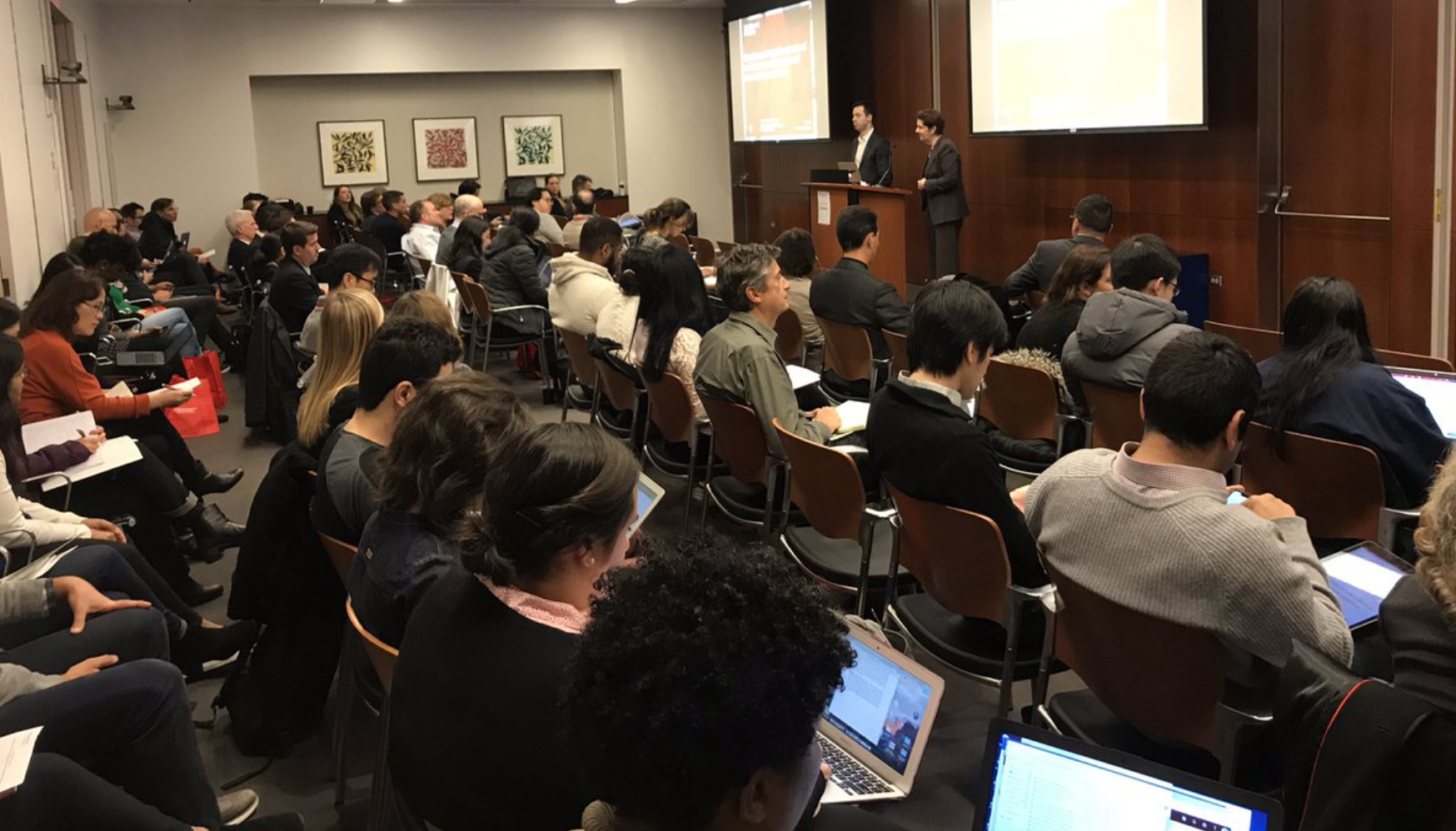
The Englander Institute for Precision Medicine’s (EIPM) Symposium fueled innovation and collaboration, bringing together nearly 200 faculty, students, and research staff last Thursday, November 15th. The inaugural event, “Innovations and Emerging Opportunities in Personalized Medicine,” featured speakers across areas of expertise from Weill Cornell Medicine, Cornell University, Cornell Tech, and NewYork-Presbyterian Queens. The full day of presentations covered topics of Novel Therapeutics, Technological Advancements, Drug Target Discovery, and Big Data Integration.
Building off of this enthusiasm, EIPM Director Olivier Elemento, Ph.D., highlighted accomplishments of the EIPM and the role the Institute will play in the future of genomics. He emphasized genomics as a resource that will continue to help clinicians better diagnose, treat, and prevent disease in the future. Encouraging the benefits of cross-campus collaboration, Dr. Elemento’s presentation ended with a commitment to bringing personalized medicine to every patient, regardless of their financial resources.
Presentations throughout the day focused on research, technology, and patient care needed to make precision medicine a success at Weill Cornell Medicine.
The Englander Institute’s Director of Research Pathology, Juan Miguel Mosquera, M.D., first detailed disease focused working groups, which EIPM Director of Bladder Cancer Research, Bishoy Faltas, M.D. elaborated on during his talk, “Evolution-targeted therapy of urothelial carcinoma.” Recently appointed Director of Innovation, Alicia Alonso, Ph.D. spoke on epigenomics for precision medicine, and the genomic basis of genitourinary birth defects.
Director of Informatics and Computational Biology Andrea Sboner, Ph.D. explored cutting-edge bioinformatics technologies to foster precision medicine, and affirmed that he was proud to provide high quality genomics results to our patients.
Technology and cutting-edge solutions were covered by Director of the Center for Neurogenetics, M. Elizabeth Ross, M.D., Ph.D., Marcin Imielinski, M.D, Ph.D., and Iman Hajirasouliha, Ph.D., who explained approaches to working through unresolved cases, signatures of complex structural variation and novel algorithms for sequencing data.
A brief networking lunch followed for participants to learn more about our Tumor Organoid and High-Throughput Drug Screening platforms, resources like the Preclinical Pharmacy and Hyperion Imaging System, as well as programs like NIH’s All of Us Research Initiative.
Cora Sternberg, M.D., the Englander Institute’s new Clinical Director, discussed the significance of genomics on diagnoses and treatment in prostate cancer. Her remarks struck Panos Vlachostergios, M.D., Ph.D., a fellow in Dr. Faltas’ labs especially insightful, “Dr. Sternberg provided an excellent summary of how precision medicine is altering the present and future of prostate cancer management. She is the expert in this field.”
Recalling a case that responded exceptionally well to personalized therapy, Allyson Ocean, M.D.,co-founder of Let’s Win: Pancreatic Cancer, relayed her patient’s appreciation for their genomic sequencing report. “The precision medicine report suddenly took the nameless, shapeless enemy of mine, and snapped into focus. It took away the terror of being a cancer patient.”
Program Manager for the Institute’s clinical team, Noah Greco, M.B.A., highlighted the multidisciplinary team working together to processes these reports, and how clinicians can order genomic tests going forward. He mentioned that mobile applications to collect clinical data are in development, and will help provide clinicians with real time responses to treatment for better patient care.
Collaborative Researchconcluded the day, with Monica L. Guzman, Ph.D., presenting on targeting AML with the epichaperome at the single cell level, and Evi Giannakakou, Ph.D. discussing molecular, computational, and clinical translation approaches to overcoming drug resistance in cancer. Benjamin Hopkins, Ph.D. discussed personalized models in cancer and steps to move from bench to bedside.
The symposium was an important reminder of the potential of precision medicine to benefit a wide range of patients. We look forward to advancing research and discovery efforts across the Cornell community through continued collaboration. Thank you to all speakers, WCM, Cornell University and Cornell Tech faculty and staff for interest and enthusiasm.
# # #
